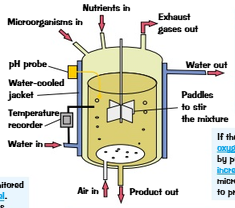food production (micro-organisms)
1/21
There's no tags or description
Looks like no tags are added yet.
Name | Mastery | Learn | Test | Matching | Spaced |
|---|
No study sessions yet.
22 Terms
fermentation
- when microorganisms break sugars down to release energy
- usually by anaerobic respiration
process of making yoghurt
- equipment sterilised
- milk is pasteurised then cooled
- lactobacillicus bacteria added + mixture is incubated in a fermenter
- bacteria ferment the lactose sugar to form lactic acid
- lactic acid causes milk to clot + solidify into yoghurt
- flavours/colours added
why is the equip sterilised + why is the milk pasteurised
to kill off any unwanted microorganisms
how is the milk pasteurised
heated up 72C for 15 sec
how is the mixture incubated when the bacteria are added
heated to abt 40C
what are microorganisms grown in
fermenters in liquid "culture medium" (nutrient rich substance)
fermenter diagram
ADD DIAGRAM

how are nutrients provided for the microorganisms
liquid culture medium
how does monitoring the pH of fermenter mean highest product yield
- ensure it is kept at optimum pH level
- for microorganisms' enzymes to work efficiently
- rate of reaction as high as poss
how does monitoring the temp/ water-cooled jacket mean highest prod yield in fermenter
- optimum temp
- ensures not so hot that enzymes denature
how does paddles (agitation) mean highest prod yield in fermenter
- microorganisms kept in contact with fresh medium
- circulates the medium around the fermenter
- microorganisms always have access to nutrients needed for growth
how are fermenters sterilised between uses
with superheated steam
how does sterlising/ aseptic conditions mean highest prod yield in fermenter
- kills unwanted microbes
- microorganisms aren't competing with other organisms
- product not contaminated
how are fermenters oxygenated
by pumping in sterile air
how does oxygenation mean highest prod yield in fermenter
- microorganisms can always respire
- to provide the energy for growth
yeasts role in bread making
- enzymes break down carbohydrates in flour -> sugars
- yeast uses these sugars in aerobic resp -> produces CO2
- when O2 runs out, yeast switches to anaerobic resp (fermetation) -> produces CO2 and ethanol
- CO2 produced is trapped in bubbles in dough
- pockets of gas expand + dough begins to rise
- yeast continues to ferment in oven until dough temp is too high + it is killed
making bread
- bread dough made - yeast, flout, water, bit of sugar
- dough left in a warm place to rise
- yeast + enzymes do stuff
- CO2 trapped in bubbles in dough + these pockets expand making the dough rise
- dough baked in oven + any alcohol is boiled away
effect of changing temp on yeast CO2 production thru anaerobic resp
- mix together sugar, yeast, distilled water + add to test tube
- add a layer of oil on top
- attach a bung with tube leading to 2nd test tube of water
- place tube n water bath at certain temp
- leave tube to warm + count bubbles produced over given period
- calc rate of CO2 production
- repeat with diff temp water baths
- resp should inc (up to certain temp) bc controlled by enzymes
why is an oil layer added
to prevent oxygen getting in and create anaerobic conditions
how do u calculate CO2 production
by dividing no. of bubbles/ time taken for production
how woud u change the exp to test other conditions
do exact same but keep temp of water bath same
how could you make experiment more accurate
replace 2nd test tube with gas syringe so you'd measure gas vol and not bubbles